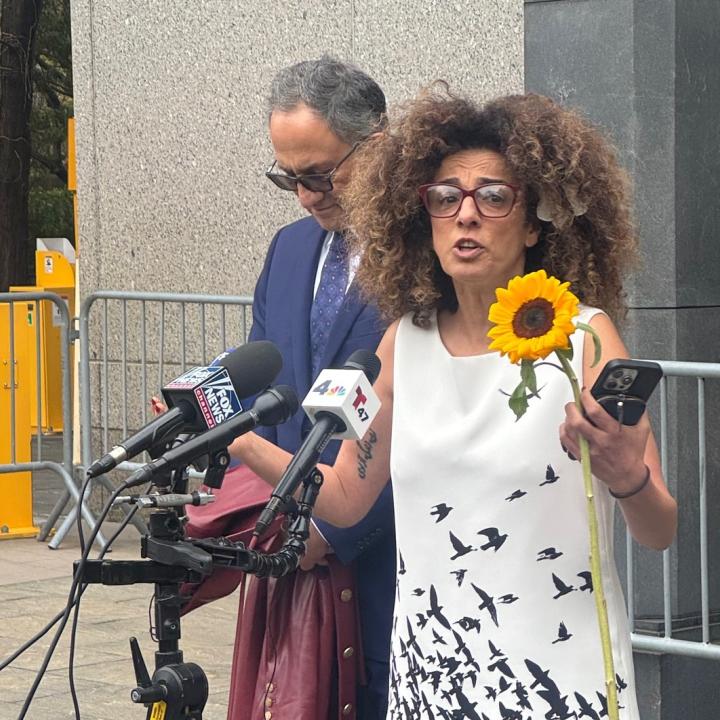
- Policy Analysis
- PolicyWatch 4135
The United States Must Do More for Iranian Dissidents

Recent convictions in the Masih Alinejad case represent a win for dissidents everywhere, but a surge in Tehran’s hostile acts abroad requires more aggressive countermeasures, such as those laid out in the bipartisan Transnational Repression Policy Act.
Seated in their yellow prison uniforms, the Russian mobsters Rafat Amirov and Polad Omarov were each handed twenty-five-year prison sentences on October 29 for a failed 2022 plot to assassinate Iranian-American journalist and women’s rights activist Masih Alinejad. They had targeted Alinejad at her New York home on behalf of the Islamic Republic, marking the second case of transnational repression against her, following an international kidnapping attempt in 2021 aimed at transporting her by speedboat out to sea and eventually to Venezuela.
The October sentencing—and preceding March verdict—was a major win for dissidents of Iranian origin and others who have been targeted by their governments. Judge Colleen McMahon expressed her hope that the sentencing would send a message to foreign gangs and powers like Iran “that this kind of conduct will not be tolerated by the United States.”
Yet as pressure mounts on the Islamic Republic amid the second Trump administration’s “maximum pressure” policy, and as Tehran recalibrates following the June 2025 twelve-day war, repression has skyrocketed. The regime has carried out more than 21,000 arrests since June, and more than a thousand executions since January—the highest levels in at least fifteen years. Increasingly, Tehran’s calculus includes transnational repression. This makes it imperative for the U.S. government to exert greater efforts to protect Iranian dissidents, journalists, and other vocal opponents of the clerical establishment within the United States and abroad.
What Is Transnational Repression?
The concept of transnational repression has been defined in broad terms but has no official legal status. While assassination attempts and kidnapping are the most visible forms conducted by foreign governments—such as China, India, Iran, and Russia—the FBI offers a broader set of categories:
- Abusive legal practices (e.g., asset freezes, lawsuits, or withholding legal documents such as passports)
- Assault
- Cyber hacking
- Coercing or forcing victims to return to their country of origin
- Harassment
- Intimidation or threats
- Online disinformation campaigns
- Stalking
- Threatening or detaining family members or friends in the country of origin—as in the case of Alinejad’s family, whose brother was sentenced to prison for eight years on bogus charges
Harassment and intimidation of activists, dissidents, journalists, ethnic and religious minorities, and students—whether U.S. citizens, permanent residents, or asylum seekers—are among the most frequent forms, but can be hard to measure given that these acts sometimes occur online. All tactics carry serious personal, psychological, and professional effects for the victims and can drive them to self-censor or even give up on their country-related work altogether. The pressure also tends to have financial impacts, such as the loss of livelihood, assets, or property. It is important to note that acts of transnational repression are hardly unique to the United States—they have also occurred in Canada and across Western Europe, particularly in the United Kingdom.
According to The Washington Institute’s Iranian External Operations Interactive Map and Timeline, Iran has conducted at least 273 acts of transnational repression since 1979. Research by the U.S.-based Abdorrahman Boroumand Center for Human Rights in Iran shows the figure above 900 when including acts within Iran. In recent years, Tehran has refined its tactics, mainly outsourcing dirty work to criminals from biker gangs and mobs, thereby allowing the regime to claim plausible deniability.
Separate from the two documented attempts against Alinejad, another U.S.-based example of transnational repression occurred in January 2024, when three individuals—one Iranian and two Canadians—were charged with plotting to assassinate an unidentified Iranian defector and his wife in Maryland. Months later, in May 2024, an employee of the Iranian Interests Section, the country’s de facto diplomatic office in the United States, reportedly made a death gesture toward activists at a protest in Washington DC.
Just as Alinejad’s case closed, the daughter of the late German citizen and U.S. resident Jamshid “Jimmy” Sharmahd announced that his body would be repatriated to America for burial on November 4, 2025. Five years earlier, Sharmahd had been abducted from the United Arab Emirates and transported via Oman to Iran, where he was sentenced to death in an unfair trial and executed in October 2024. His case and other instances highlight the urgency of addressing transnational repression as a global security, sovereignty, and human rights issue. Given its reliance on criminals, transnational repression should also be approached as a counterterrorism and national security problem.
How to Respond to Tehran’s Threats
In 2021, in response to the attempted kidnapping of Alinejad, Congress passed the Masih Alinejad HUNT Act of 2021, which requires the State Department to periodically report to Congress on the identities of foreign individuals acting for the Islamic Republic, and to grant the U.S. president information that could facilitate sanctions on Iranian officials responsible for human rights abuses—e.g., property blocks or visa bans. The legislation accordingly directs the Treasury Department to identify for Congress banks that conduct transactions with such individuals. While Iranian dissidents viewed these terms as an achievement, only some progress on transnational repression has followed. President Trump did acknowledge the problem in his February 2025 “maximum pressure” memorandum, which directs the attorney general to “prosecute leaders and members of Iranian-funded terrorist groups that have captured, harmed, or killed American citizens and seek their arrest and extradition to the United States.”
Secretary of State Marco Rubio echoed this language in March, a day after the Alinejad verdict was announced, posting on social media: “Yesterday’s court decision shows Iran’s attempts at lethal plotting against Americans like @AlinejadMasih will be met with swift justice & accountability. Under @POTUS, Iran’s front groups and proxies trying to operate in the U.S. will be investigated, disrupted, and prosecuted.”
While such statements are welcome, more support must be given to address the full spectrum of transnational repression by the Islamic Republic and other countries—an effort on which Congress is continuing to lead the charge. This past July, Sens. Jeff Merkley (D-OR) and Dan Sullivan (R-AK), as well as Reps. Chris Smith (R-NJ) and Jim McGovern (D-MA), introduced the bipartisan Transnational Repression Policy Act to elevate the issue as a key foreign policy priority. The legislation not only introduces a legal definition of transnational repression but also calls for strengthening collaboration and coordination with U.S. allies, pursuing criminal prosecutions, and publishing a guide outlining federal resources. It further calls for an interagency strategy that includes assistance programs to support victims of transnational repression, research initiatives, and training for Interpol’s Washington office and U.S. law enforcement at all levels to identify and counter acts of transnational repression.
Working through the Justice Department, the FBI along with the Department of Homeland Security and State Department have been integral to addressing transnational repression by foreign governments. Yet gaps remain, as noted in the proposed Transnational Repression Policy Act. To effectively counter Iranian transnational repression, the U.S. government should:
- Establish a U.S. legal definition of transnational repression and train law enforcement and key agencies, including those that focus on organized crime, to recognize the practice—especially in cities with large Iranian-American populations such as Los Angeles, Washington DC, and Seattle.
- Ensure senior U.S. officials regularly denounce acts of transnational repression in public, as Secretary Rubio has done. The United States should lead the effort to adopt a common standard across North America, Europe, and Asia to condemn transnational repression by any country. In July 2025, an associated gesture saw fourteen Western countries condemn “attempts of Iranian intelligence services to kill, kidnap, and harass people in Europe and North America.”
- Develop sustained outreach mechanisms for vulnerable members of the Iranian diaspora in America and abroad, using roundtables and town halls as part of a broader coordinated effort with allies and partners to identify their specific concerns, and respond with new policy measures.
- Deepen coordination with Canada, which has developed a holistic program targeting transnational repression as part of its G7 presidency beginning in January 2025, making the issue a key priority. As a neighbor and fellow G7 member, the United States is well-positioned to strengthen joint efforts, particularly given its leading role in the G7 Rapid Response Mechanism working group on transnational repression.
- Impose targeted sanctions on perpetrators, as authorized under the HUNT Act and Global Magnitsky Human Rights Accountability Act.
- Launch a refugee resettlement program to protect at-risk victims, particularly in Iran’s neighbors like Turkey, where Iranian intelligence tends to operate with relative freedom. The United States has a moral and strategic interest in protecting freedom and democracy. Advocates of these ideals, who have assumed profound risks to promote them, have been forcibly driven from Iran under threat of imprisonment, torture, or death. Given the opportunity and assurances of safety, they would return and continue seeking to implement positive change once conditions allow.
- Implement rigorous screening for diplomatic personnel with histories tied to repression, as noted by the State Department’s spokesperson. In 2014, Iran’s nominee for United Nations ambassador, Hamid Aboutalebi, was denied a visa due to his involvement in the U.S. embassy seizure in 1979.
- Provide security to individuals facing credible threats exposed by the Justice Department, mirroring efforts made for Alinejad. This means restoring protection for former National Security Advisor John Bolton, former Secretary of State Mike Pompeo, and former Iran envoy Brian Hook.
Holly Dagres is the Libitzky Family Senior Fellow at The Washington Institute and the curator of The Iranist newsletter.



